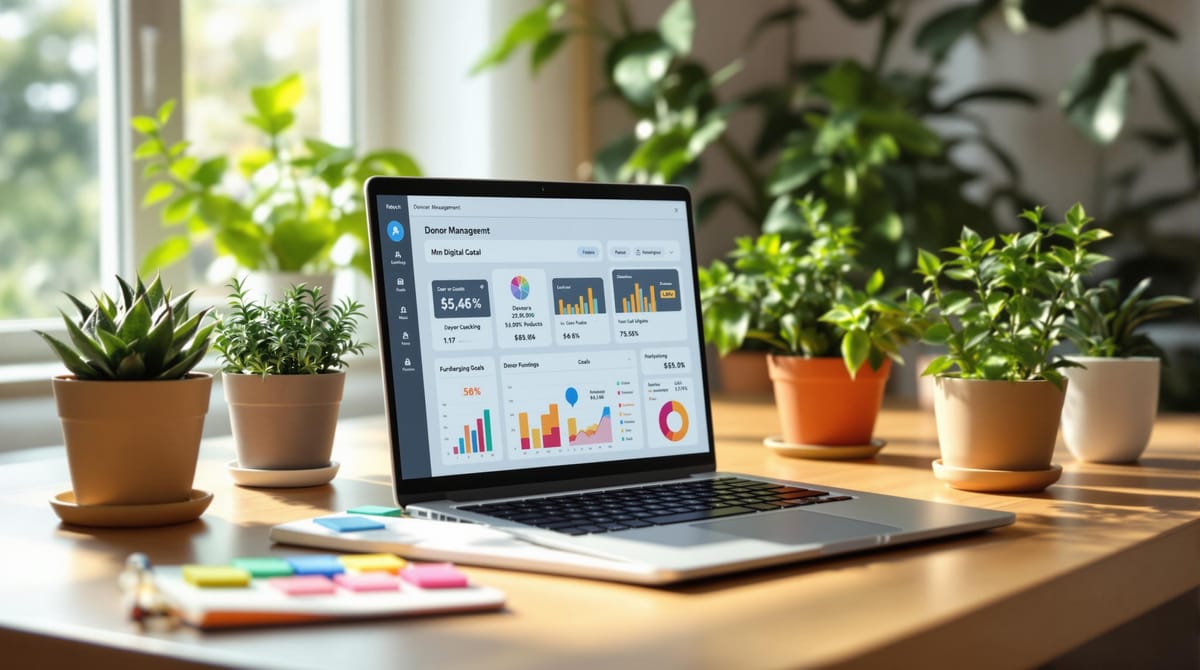Donor Management 101: Building Your Digital Database
Learn how a digital donor database enhances donor management, improves communication, and boosts fundraising for nonprofits.

Managing donors effectively is crucial for nonprofits, especially for programs like child sponsorships. A digital donor database helps centralize information, improve communication, and make smarter fundraising decisions. Here’s what you’ll gain:
- Centralized Data: Store donor profiles, giving history, and engagement details in one place.
- Personalized Outreach: Tailor communication to donor preferences and history.
- Automation: Save time with tools for thank-you notes, updates, and payment tracking.
- Smarter Decisions: Use data insights to identify trends, key donors, and opportunities.
For child sponsorship programs, these tools simplify sponsor-child updates and strengthen relationships. Platforms like DonorPerfect, HelpYouSponsor, and Virtuous CRM offer features like customizable tracking, real-time insights, and integration with other tools.
Looking for the best software? Compare costs, features, and scalability to match your nonprofit’s needs. Ready to boost donor engagement and retention? Let’s dive into the details.
What You Need to Know About Donor Databases
Defining Donor Databases
A donor database acts as your nonprofit's hub for managing relationships with supporters. It’s not just a list of names and contact information - it’s a system that tracks every interaction and detail about your donors.
Modern donor management systems capture a wide range of data, such as:
| Data Category | Information Tracked |
|---|---|
| Donor Profiles | Contact details, demographics, communication preferences, and interaction history (e.g., emails, calls, meeting notes) |
| Giving History | Donation amounts, frequency, payment methods, and campaign responses |
| Engagement Data | Event attendance, volunteer history, and program participation |
Why Use a Digital Donor Database?
Digital donor databases streamline donor management by keeping all information in one place, allowing for better organization, segmentation, and integration with other tools. These features help nonprofits improve donor retention and fundraising outcomes by enabling targeted outreach and accurate tracking of goals.
Here are some key features and their benefits:
| Feature | Benefit |
|---|---|
| Data Accuracy Tools | Ensure donor information stays up-to-date and reliable |
| Progress Reporting | Monitor fundraising goals and donor engagement metrics |
| Prospect Tracking | Spot potential major donors by analyzing giving patterns |
| Outreach Segmentation | Tailor communications for specific donor groups |
For programs like child sponsorships, donor databases help track preferences and send timely updates, ensuring personalized communication with sponsors. By reviewing giving trends and interaction history, nonprofits can make smarter decisions about their fundraising and engagement strategies.
Additionally, integrating your donor database with other tools prevents isolated data and ensures your team has consistent access to accurate donor information. Keeping your data organized and reliable is key to getting the most out of your donor database.
Once you understand the benefits, the next step is finding the software that fits your nonprofit’s specific needs.
How to Pick the Best Donor Management Software
Features to Look For in Donor Tools
Choosing the right donor management software means focusing on tools that fit your nonprofit's goals and day-to-day operations. Look for features that can help you work smarter, like:
| Core Feature | Purpose |
|---|---|
| Interactive Dashboards | Deliver real-time insights into donor activity and campaign outcomes |
| Wealth Screening | Pinpoint high-value donors to target major gift campaigns effectively |
| Advanced Integration | Sync easily with your current fundraising and communication platforms |
Examples of Donor Management Software
There are several platforms tailored to nonprofits, each offering unique benefits. DonorPerfect, starting at $99 per month, includes a customizable database, advanced batch entry, and role-based access control. HelpYouSponsor provides flexible pricing options, including a free plan for smaller organizations and scalable tiers for larger nonprofits - perfect for managing child sponsorship programs.
Virtuous stands out with real-time recommendations for personalized donor outreach, helping nonprofits refine engagement strategies. These tools empower organizations to make better decisions about donor relationships and campaign effectiveness.
Understanding Costs and Growth Potential
When comparing costs, think about both your current needs and how your organization might grow. Many platforms use tiered pricing that adapts as your nonprofit expands. Look beyond the price tag and consider added benefits like data migration support, staff training, compliance with security standards (like GDPR and CCPA), and responsive customer service.
For nonprofits focused on child sponsorships, platforms like HelpYouSponsor make it easier to track sponsorship details and personalize updates, strengthening donor connections. Choosing software that matches your needs and growth plans can set the stage for long-term success in donor management.
Once you've found the right software, use its full potential to nurture stronger relationships with your donors.
Ways to Strengthen Donor Relationships
Personalizing Donor Communication
Use donor preferences and giving history to make your communication more personal. Tools like donor management software can help you tailor updates, showing exactly how their contributions are making a difference for the children they support.
Leveraging Automation for Consistent Outreach
Automation tools can simplify tasks like sending thank-you notes or sharing updates about the impact of donations. This ensures donors feel appreciated and informed without overwhelming your team. Platforms like Virtuous offer real-time insights to help you customize outreach and maintain strong donor relationships.
Hosting Events to Show Gratitude
Events such as virtual updates or sponsor-child meet-and-greets provide a meaningful way to connect with donors. These interactions not only highlight the impact of their support but also deepen their connection to your cause. HelpYouSponsor's platform, for instance, makes it easy to facilitate virtual meetings between sponsors and children, building stronger ties.
"Nonprofits with higher-than-average donor retention rates typically achieve this through a focus on donor appreciation, impact reporting, and segmented appeals"
For child sponsorship programs, these approaches help sponsors feel more connected to the children they support. By combining personal communication, automated outreach, and engaging events, nonprofits can build stronger, long-term donor relationships while also improving donor data management.
How to Turn Donor Data into a Secret Weapon for Nonprofits
Tips for Managing Donor Data Effectively
Modern donor management systems allow nonprofits to keep track of donor information, analyze it, and use it to strengthen relationships and boost contributions.
Collecting and Organizing Donor Data
Platforms like DonorPerfect provide customizable tools that make it easier to standardize how you collect data. Focus on creating detailed donor profiles, and use validation tools, such as those from Givebutter, to avoid duplicate entries and maintain accurate records.
Using Data to Track Donor Trends
Use donor data to uncover patterns in giving and engagement. For example, you can reconnect with donors who have been inactive for 6–9 months through targeted outreach.
Some effective ways to use donor data include:
- Spotting key donors and identifying changes in their giving habits early
- Monitoring retention rates based on how donors were acquired
- Tailoring outreach efforts to specific donor segments
"Nonprofits with higher-than-average donor retention rates typically achieve this through a focus on donor appreciation, impact reporting, and segmented appeals"
Encouraging Regular Donations
Understanding donor behavior can help turn one-time contributors into recurring supporters, providing a steady funding source. For instance, Virtuous CRM uses donor data to suggest personalized appeals in real-time. These tools can also automate thank-you notes, track donor engagement, and showcase the impact of monthly gifts, making recurring donations more appealing.
Consider offering perks to recurring donors, like early access to updates or invitations to virtual events featuring program beneficiaries. Managing donor data effectively is especially important for programs like child sponsorships, where personalized updates and detailed tracking are key to maintaining strong relationships with sponsors.
Managing Child Sponsorship Programs with Donor Databases
Keeping Sponsors Connected to Children
Maintaining personalized communication plays a crucial role in keeping donors engaged, especially in child sponsorship programs. Modern donor databases make it easier for organizations to share tailored updates that nurture the bond between sponsors and the children they support. For example, Virtuous CRM uses real-time analysis to optimize when progress reports, photos, and updates are sent. This approach not only deepens engagement but also helps staff work more efficiently.
In addition to personalized updates, these databases simplify the often complex administrative tasks tied to managing sponsorship commitments.
Tracking Sponsorship Details Easily
Platforms like HelpYouSponsor make managing sponsorships much simpler with customizable tracking tools. Their Pro Plan, priced at $39/month, supports up to 80 sponsorship commitments, making it a great fit for nonprofits that are expanding. The platform’s usage-based pricing ensures organizations only pay for active sponsorships, helping them scale their programs without overspending.
DonorPerfect offers features like automated payment processing, customizable tracking, and batch data entry to reduce administrative burdens. These tools help nonprofits keep accurate records and streamline tasks. For example, when sponsors request new child matches or need assistance with correspondence tracking, the database flags the necessary actions and maintains a clear timeline of interactions.
To get the most out of these systems, organizations should focus on keeping their data accurate and regularly updated. This ensures smooth communication between sponsors and the children they support, strengthening these important relationships over time.
Conclusion: Key Points to Remember
A digital donor database does much more than store information - it serves as the backbone for effective donor management. Tools like DonorPerfect, with features like interactive dashboards and wealth screening metrics, show how software can transform donor management into a strategic asset.
Starting at $99/month, DonorPerfect simplifies processes with automated payments and customizable tracking, enabling organizations to grow with ease. Similarly, Givebutter ensures donor records are clean and accurate, which is crucial for personalized outreach and campaign success.
Re-engage donors who have been inactive for 6–9 months with targeted campaigns to prevent them from lapsing completely. For child sponsorship programs, these tools are particularly useful for managing personal connections and complex administrative needs.
Virtuous CRM helps streamline communication while fostering stronger sponsor-child relationships. The key to success is using these tools wisely: keep records accurate, track interactions consistently, and use automation to enhance - rather than replace - personalized communication.

